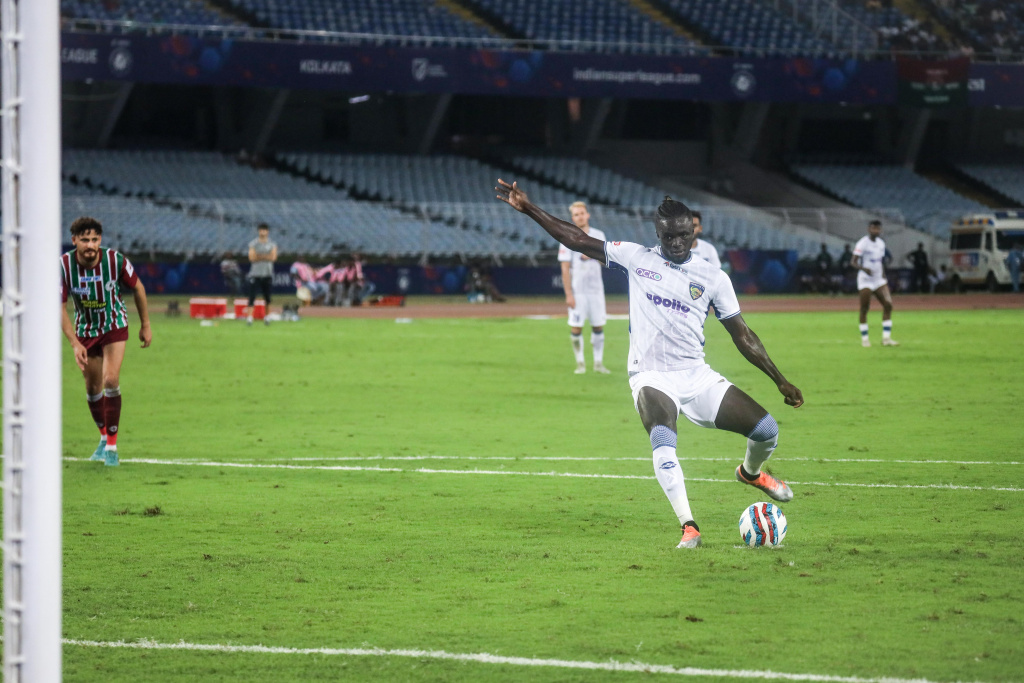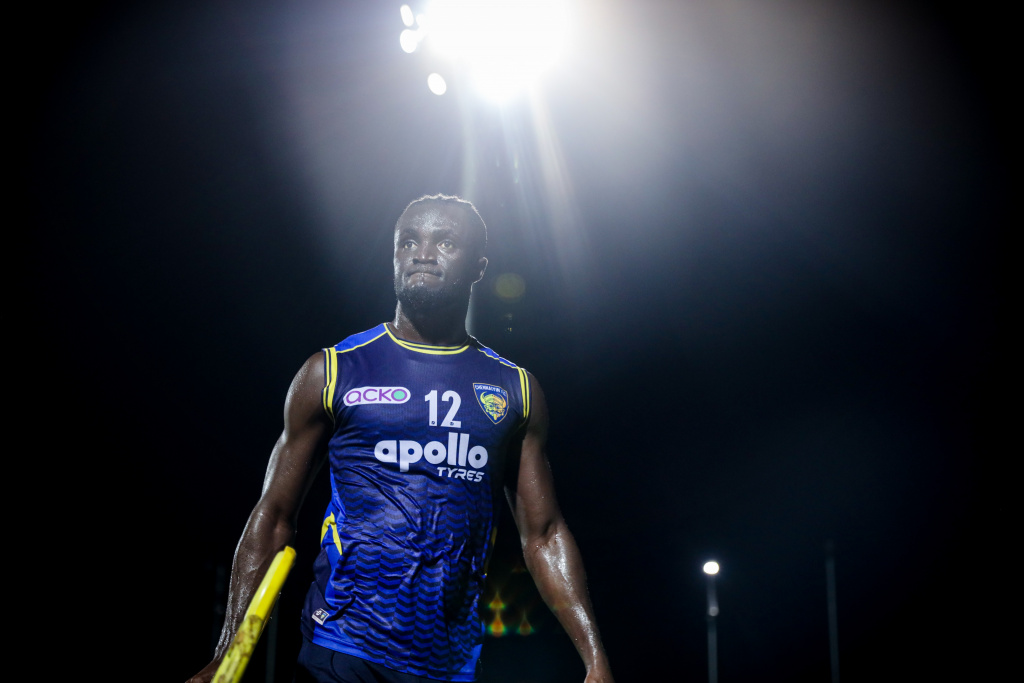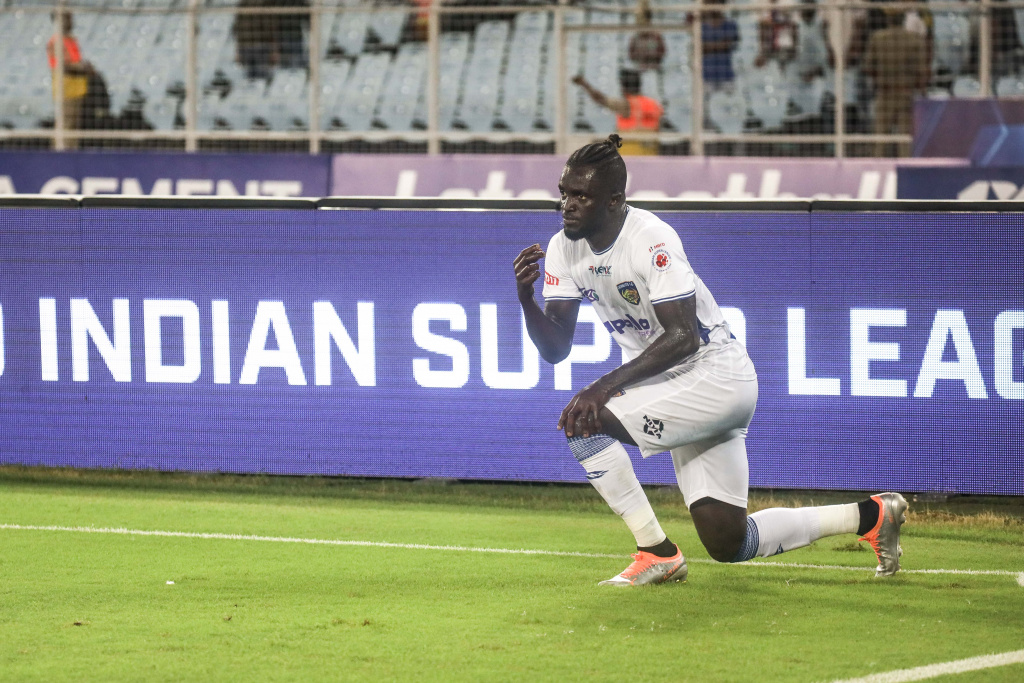The Chennaiyin FC forward has turned out for 14 clubs across 11 countries since 2010.

First published: https://www.moneycontrol.com/news/trends/sports-trends/future-of-indian-football-international-players-new-talent-in-leagues-chennaiyin-fc-9455251.html
Chennaiyin FC’s Kwame Karikari: ‘I’m just happy to play football, wherever that is’
Kwame Karikari has turned out for 14 clubs across 11 countries since 2010: Ghana, Sweden, Norway, Qatar, UAE, Egypt, Uzbekistan, Thailand, Turkey and now India.
A day before he is scheduled to take a flight, Kwame Karikari’s anxiety hits new levels. And given a choice between flying and an alternate mode of transport, the Ghanian would pick the latter without any second thoughts.
“Honestly, I hate flying. Anytime I have a flight, I start to think too much the previous day. But as a footballer, I really have no choice,” Karikari says.
The home-away format, which most leagues around the world have adapted to, means that Karikari, 30, has had to accept this as part of his job. But flying takes a wholly different meaning when one takes a look at his 11-year-long professional career.
Karikari has turned out for 14 clubs across 11 different countries since 2010. After Ghana, where he started his football, he has plied his trade in Sweden and Norway in Europe, Qatar and the United Arab Emirates in the Middle East, Egypt in Africa and Uzbekistan and Thailand in Asia, besides a host of other countries.
Earlier this year, the journeyman made his move to India after signing with Chennaiyin FC. On his Indian Super League debut against ATK Mohun Bagan last month, he came on as a substitute and created an instant impact. In just 32 minutes, he scored a goal and provided an assist in their 2-1 win.

“I’m always looking for new experiences and Chennaiyin presented me with a good challenge. I had never been to India, so I thought – let me come here and see what adventures await me,” he says.
It would all have turned out very differently for Karikari. While growing up in the capital city of Accra, he hoped to follow in his father’s footsteps and don the uniform – Kofi Amponsah spent 35 years in the Ghana Army. Football was something that he chased alongside track and field at school, though neither was a priority back then.
“After finishing high school, I really started enjoying football. My friends encouraged me to take the game more seriously, so I joined an academy at 18,” he recalls.
At International Allies, he made an instant impact. The president saw his potential and suggested he move to their residential facility, where he could focus all his attention on football. Six months later, he was on his way to Sweden to turn out for AIK Solna as the No. 1 pick from the academy.
However, Europe was a whole new world for Karikari. He struggled with the culture and the cold weather alike.
“Leaving home was very difficult. I had been living with my mother since I was 12. And now I was leaving the country. I was really young, so the club got me a host family who were originally from Eritrea. They helped me with everything, supported me and really cheered me up. This was something that helped immensely,” he says.
For the next four years, Karikari played in Sweden, before he began hopping countries.
“Whenever I considered moving to another team, I would speak to the coach to see what kind of system he liked to play. For instance, when some coaches saw that I was big and tall, they would think I’m a target player and ask me to stay around the box. But on the other hand, I like to move around and am everywhere on the pitch. So it was essential to understand if I could fit into the style of play at the club,” he says.
What was most critical for Karikari was to get adequate game time wherever he went. He didn’t believe in picking up a paycheque for warming the bench. For instance, when he was left out most times at Neftchi Baku in Azerbaijan, he ended his 1.5-year contract and moved after just six months.
“I’ve worked really hard at each club in order to get my chance to play. When there’s not enough game time, it’s not good for me as well as my career. And this has often resulted in me switching clubs. I don’t believe in taking money every month and relaxing,” he says.
Like most job opportunities, this has often proved to be a hurdle when it comes to potential employers. A few understand Karikari’s point of view; with others, he has had some explaning to do.
“A few coaches want to understand why I’ve changed so many clubs. They make inquiries – is there some issue with him, is it his attitude? Or has he created problems in the past? Once they speak to me, I apprise them of the situation and only then do they understand why everything has happened the way it has in my career,” he says.

The travels over the years have brought all kinds of experiences for Karikari. One that he holds close to heart is his time at Turkish club, Balikesirspor, where he’s had two stints so far.
“It’s a small club based out of a small city, Balikesir, around six hours from Istanbul. And they never had a black player on the team – Lalawele Atakora from Togo and I were the first. They treated us like kings, the fans were in love with us. We were given free food at restaurants and discounts when we went shopping. They had songs for me and still leave messages on social media. I can never forget the love they showered on me,” he says.
“The first year that I was with them, they won the championship and earned a promotion. And during the second stint, we won the league again and joined the Super Lig, the top division. We made great memories together,” he adds.
On the other hand, a few forgettable stints were when he didn’t get his salary for months and had to quit. Or the time when he had to leave Norway in a hurry.
“I had started very well at the club after scoring a few goals. But even today, the fans at Haugesund haven’t understood why I left one fine day and continue to text me about it. What happened was that I had driven to Sweden to pick up my belongings while playing at the previous club. And in some places the speed cameras captured me driving really fast. So a month later, I was called to the police station. Speeding is considered a criminal offence there and if I wanted to stay in the country, I would have to serve jail time. My lawyer advised me to pay the hefty fine and simply leave the country,” he recalls.
“Ever since, I don’t want to drive anywhere I go, even if they give me a car,” he adds.
At the end of every season, Karikari goes back home to regale his mother, Grace Formadi, with all his experiences.
“If I’m getting a new job, it means I’m doing well. So, she’s always happy when I’m moving to another country,” he says.
But from a few others, he often gets the obvious question of how many countries he’s played in.
“Maybe 10 countries. And perhaps 12 or 13 clubs. Or maybe it’s 14. Normally I don’t really check. I’m just happy to play football, wherever that is,” he says.
One of the things he wants to do in the near future is create a gallery at home that exhibits all his club jerseys alongside the national flag. And of course, pen an account of his experiences over the years.“I think I have a good story to write once my career is over,” he says.